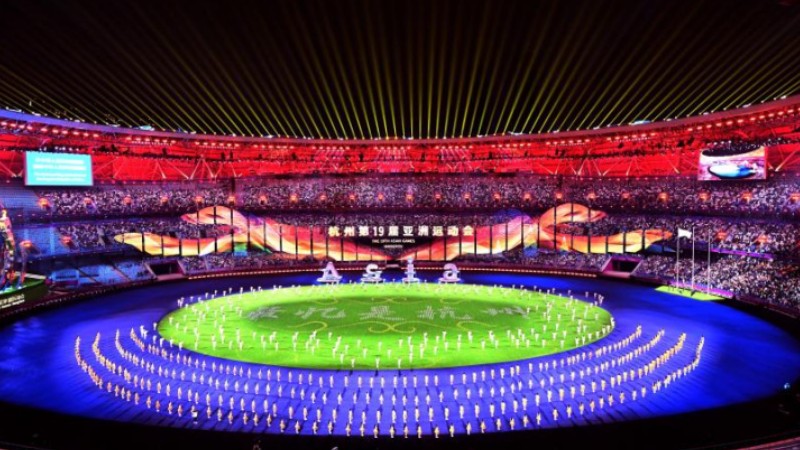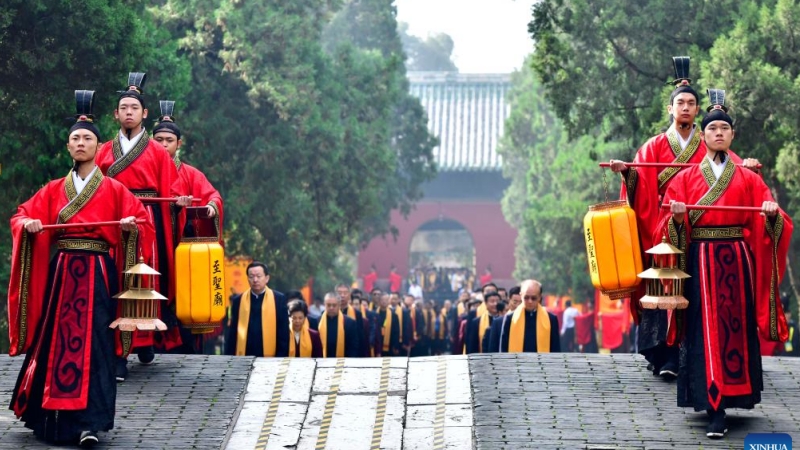U.S.-China forum calls for revitalizing relations through music
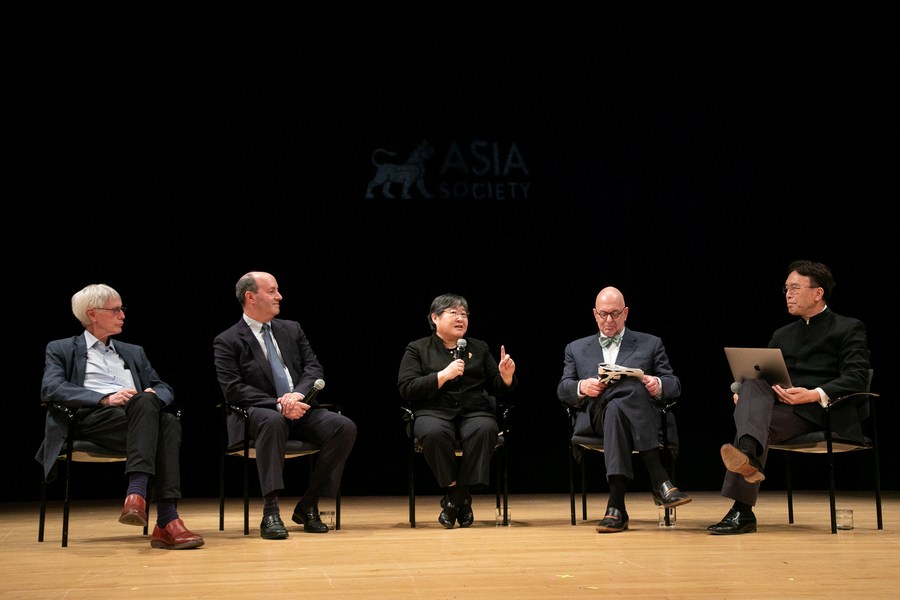
Orville Schell, director of the Center on U.S.-China Relations at Asia Society, Gary Ginstling, president and CEO of the New York Philharmonic, Chen Yi, professor at the Conservatory of Music and Dance at the University of Missouri-Kansas City, Leon Botstein, president of Bard College and founder of the innovative pre-professional orchestra The Orchestra Now, and Jindong Cai, director of the U.S.-China Music Institute and conductor of the Bard's East/West Ensemble (From L to R), participate in the U.S.-China Music Forum at The Asia Society in New York, the United States, Oct. 7, 2023. (Photo by Michael Nagle/Xinhua)
Academic exchange is an important way to promote academic development and cultural exchange between the two countries. Its implications are abroad and far-reaching.
NEW YORK, Oct. 8 (Xinhua) -- Experts from China and the United States called for enhancing music education cooperation and exchanges between the two nations to energize bilateral ties.
The "U.S.-China Music Forum - Confronting Challenges and Looking to the Future" took place at the Lila Acheson Wallace Auditorium at The Asia Society on Saturday afternoon in New York.
The panelists said classical music exchanges between the two nations over the past five decades demonstrate the harmonious interplay between art and diplomacy.
They noted that, in an ever-changing world, music remains a timeless bridge that connects hearts and minds, fostering understanding and empathy between cultures.
Citing the successful cooperation between the Bard College and China's Central Conservatory of Music in the past five years, Jindong Cai, director of the U.S.-China Music Institute and conductor of the Bard's East/West Ensemble, opened the event by demonstrating his hope to strengthen the connections between China and the United States through music.
"The West and the East have been communicating through music historically," Cai pointed out, "as the Chinese traditional instrument Pipa was initially from Persia, traveled its way by the Silk Road, and reached Western China in the 4th century AD."
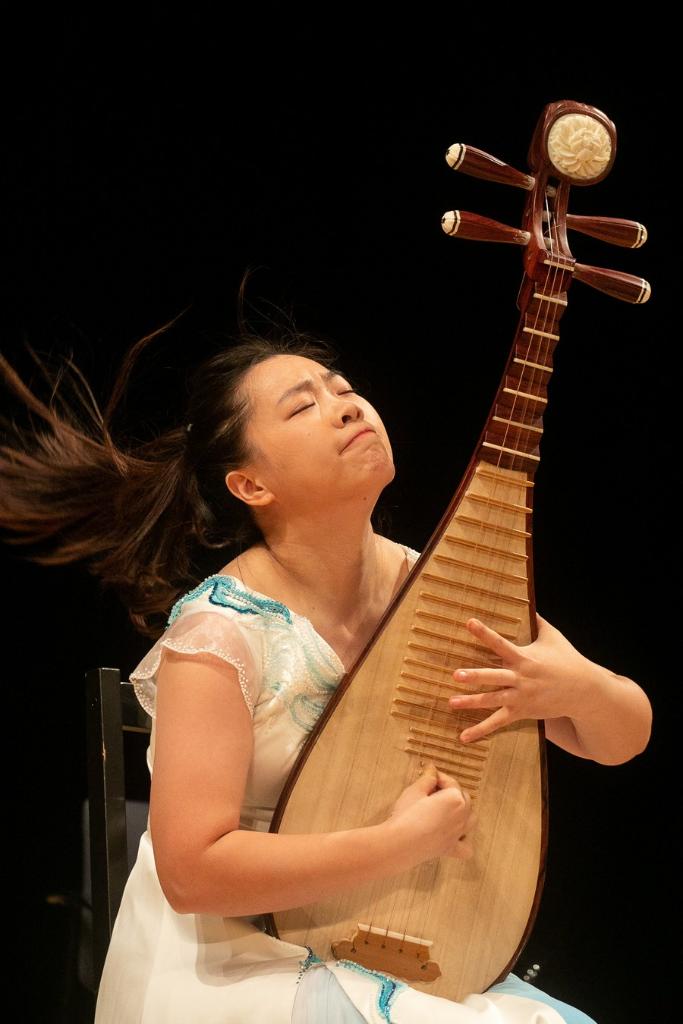
Liu Xiaojing, pipa virtuoso from the Central Conservatory of Music, performs during the U.S.-China Music Forum at The Asia Society in New York, the United States, Oct. 7, 2023. (Photo by Michael Nagle/Xinhua)
Yu Hongmei, professor and director of the Chinese Music Department at the Central Conservatory of Music, shared her perspective on advancing the friendship between China and the United States by employing music-cultural exchange.
"Academic exchange is an important way to promote academic development and cultural exchange between the two countries. Its implications are abroad and far-reaching," said Yu. "Civilization is more colorful through communication, and culture is enriched through mutual understanding and learning."
Yu concluded her speech by stating her firm belief that "educational and cultural exchange between China and the United States, especially through music, will continue to develop, and it will add a positive energy to bilateral relations."
Leon Botstein, president of Bard College and founder of the innovative pre-professional orchestra The Orchestra Now, highlighted the universality of music. "Collaboration and exchange is a long-term game to share what we have in common as human beings, regardless of one's nationality and background."
Botstein illustrated that such communication through music could foster bonding among people from different countries, as it encourages people to put down their guards and induces more friendly interactions.
Another prominent panel speaker, a distinguished professor at the Conservatory of Music and Dance at the University of Missouri-Kansas City, Chen Yi, signaled that the harmonious resonance of music can transcend political barriers and pave the way for a brighter future of collaboration, friendship and mutual respect.
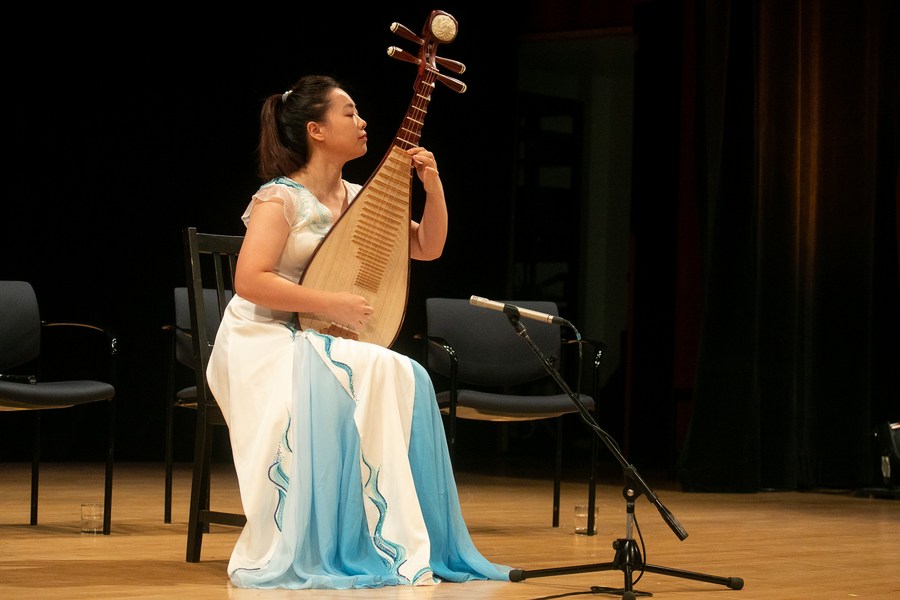
Liu Xiaojing, pipa virtuoso from the Central Conservatory of Music, performs during the U.S.-China Music Forum at The Asia Society in New York, the United States, Oct. 7, 2023. (Photo by Michael Nagle/Xinhua)
She noted that "not only the instrumental music but also the power of theater and musical storytelling, all these components will become the new language in which you will be shaped and influenced. I thought that it brought us back to our traditional roots."
"I adore classical music, and I do think it is one of the last areas where we can all sort of comfortably enjoy something together," said Orville Schell, director of the Center on U.S.-China Relations at Asia Society, expressing his hope Washington and Beijing "can use it constructively" to help stabilize the bilateral relationship.
Gary Ginstling, president and CEO of the New York Philharmonic, spoke of his recent trip to China.
"I can't wait to go back with the full orchestra," said Ginstling, referring to his trip to Shanghai with a small group of the orchestra's musicians.
The discussion was followed by music performances by pipa virtuoso Liu Xiaojing from the Central Conservatory of Music and Anita Balazs, a cellist of the Bard East/West Ensemble.
The U.S.-China Music Forum is a novel addition to the China Now Music Festival, now in its sixth year following its launch in 2018 by the U.S.-China Music Institute and China's Central Conservatory of Music.
Themed "The Bridge of Music," this year's festival is expected to conclude on Sunday.
Photos
Related Stories
- Concert showcases Chinese traditional music in New Zealand
- U.S.-China Music Forum opens at New York City
- Concert of traditional Chinese music staged in Christchurch, New Zealand
- Trending in China | The living fossil of ancient Chinese music: Xi'an Guyue
- China Now Music Festival ends with tribute to three generations of composers bridging U.S., China
Copyright © 2023 People's Daily Online. All Rights Reserved.







